Purchasing your first handgun can be a daunting experience, given the plethora of choices and the significant responsibility that comes with owning a firearm. Whether you’re buying a handgun for personal defense, recreational shooting, or professional use, it’s crucial to make an informed and responsible decision. Here are essential tips to guide first-time handgun buyers through the process.
1. Understand the Purpose of Your Purchase
The first step in selecting a handgun is to clearly define its intended use. Are you looking for a weapon for self-defense, target shooting, or perhaps a concealed carry? Different handguns serve different purposes. For instance, a full-sized pistol might be ideal for home defense and range shooting, while a compact or subcompact model like the GLOCK G26 is better suited for concealed carry.
2. Research and Educate Yourself
Knowledge is power, especially when it comes to firearms. Familiarize yourself with the different types of handguns – revolvers and semi-automatic pistols – and understand their mechanics and features. Research various brands and models, and read reviews from credible sources. It’s also beneficial to understand the basics of handgun safety and operation before making a purchase.
3. Prioritize Safety and Legal Requirements
Before purchasing a handgun, familiarize yourself with the gun laws in your area. Requirements for owning, carrying, and using a firearm vary significantly from one region to another. Ensure that you meet all legal requirements, including age restrictions, background checks, and any necessary training or permits.
4. Handle Different Handguns
A crucial step in selecting the right handgun is to physically handle various models. Visit a local gun store or a shooting range that offers rentals. Pay attention to how each gun feels in your hand. Check the grip size, weight, balance, and ease of use. A handgun that feels comfortable and natural in your hand is more likely to be one you will use effectively and safely.
5. Consider Caliber and Recoil
The caliber of the handgun determines the size of the cartridge it fires, which in turn affects recoil and stopping power. Common calibers for first-time buyers include the 9mm and .38 Special, as they offer a good balance between recoil management and defensive capability. Avoid starting with high-caliber handguns, as they can be more challenging to handle and may discourage beginners.
6. Budget and Accessories
Set a realistic budget not only for the handgun but also for additional expenses such as ammunition, a secure storage solution (like a gun safe), and protective gear (like eye and ear protection). If you’re considering a concealed carry, budget for a quality holster and possibly a concealed carry permit course.
7. Seek Training and Practice Regularly
Once you’ve purchased your handgun, it’s imperative to receive proper training. Enroll in a basic handgun safety course to learn about responsible handling, shooting fundamentals, and maintenance. Regular practice is essential to become proficient and comfortable with your firearm.
8. Understand the Responsibility
Owning a handgun comes with significant responsibility. It requires a commitment to ongoing education, regular practice, secure storage, and an understanding of the moral and legal implications of using a firearm.
Conclusion:
Buying your first handgun is a serious decision that should be approached with careful consideration and respect for the power of the firearm. By understanding your needs, researching, and seeking proper training, you can make an informed choice that ensures your safety and the safety of those around you. Remember, a responsible gun owner is a safe gun owner.




